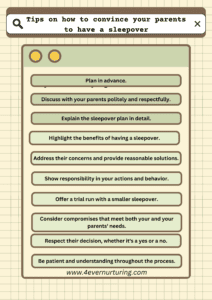Sleepovers have long been a cherished tradition among kids, offering an exciting opportunity to spend the night at a friend’s house, share laughter, games, and create unforgettable memories. These overnight gatherings foster strong bonds and allow children to develop social skills in a fun and relaxed environment. However, despite the allure of sleepovers, some parents may harbor reservations about granting their children permission to partake in these adventures. This has left many with the question: How to convince your parents to have a sleepover?
When it comes to how to convince your parents to have a sleepover, there are various things to keep in mind. These are the things that make your parents say “Yes” or “No”. When you want to convince your parents to have a sleepover, ensure you plan in advance, discuss with your parents politely and respectfully, explain the sleepover plan in detail, highlight the benefits of having a sleepover, address their concerns and provide reasonable solutions, show responsibility in your actions and behavior, offer a trial run with a smaller sleepover, consider compromises that meet both your and your parents’ needs, respect their decision, whether it’s a yes or a no and be patient and understanding throughout the process. This the only tactic on how to convince your parents to have a sleepover.
Addressing Safety Concerns in Times of Sleepover
Safety is undoubtedly a top priority for parents, and it’s crucial to acknowledge their concerns when trying to convince them about having a sleepover. By demonstrating a proactive and responsible approach, children can alleviate some of the anxieties that parents may have.
One effective strategy is to suggest having the sleepover at a trusted friend’s house. If the child has been friends with the host for a considerable time, and the parents are familiar with the friend’s family, it can significantly ease worries. Encourage your parents to meet the friend’s parents beforehand, either in person or virtually, to establish a sense of familiarity and trust.
Read About: How to Make Your Parents Buy You a Phone
Initiating this meeting provides an opportunity for both sets of parents to address any concerns openly and discuss the sleepover’s plan. Having clear communication between all parties involved can promote a greater sense of security and ensure that everyone is on the same page.
Another way to address safety concerns is by having a well-thought-out and structured plan for the evening. Discuss the activities that will take place during the sleepover and the scheduled bedtime. Assure your parents that there will be adult supervision throughout the event and that the host’s family is also committed to providing a safe and enjoyable environment.
Furthermore, consider involving parents in planning some of the activities. This involvement can help parents feel more at ease, knowing what the evening will entail and that their child will be in good hands.

Highlighting the Benefits of Sleepover
Sleepovers offer a myriad of advantages for children, extending far beyond just having a good time. As parents consider the prospect of allowing their children to participate in sleepovers, it’s essential to emphasize the positive impacts these experiences can have on their development.
Building Lasting Friendships
Sleepovers provide an opportunity for children to strengthen their friendships in a unique and intimate setting. Spending extended time together allows kids to bond, share experiences, and build trust. The memories created during sleepovers often turn into cherished moments and the foundation for lifelong friendships.
Developing Social Skills
Interacting with friends during a sleepover fosters the development of vital social skills. Children learn how to navigate different personalities, resolve conflicts, and collaborate on activities. These experiences contribute to their emotional intelligence and overall social competence.
Encouraging Independence
Sleepovers allow children to experience a sense of independence and responsibility. Being away from home for a night, even in a familiar environment, can empower kids to make decisions and solve problems on their own, boosting their self-confidence and self-reliance.
Highlighting such benefits is a strategy of getting into your parents mind and getting them to allow you to have a sleepover.
Read About: How to Make $ 1000 as A Teenager
Using Personal Stories to Get a Sleepover
The use of personal stories is an effective strategy on how to convince your parents to have a sleepover. Below are example of personal stories that you can twist and present to your parents. You can also use your stories which are based on real life experiences and people your parents know.
Many parents who were initially hesitant about sleepovers have shared heartwarming stories of how these experiences positively impacted their children’s lives. One parent, Lisa, recounted how her daughter, Emma, used to be shy and reserved around new people. However, after attending a few sleepovers with her closest friends, Emma became more outgoing and self-assured. The sleepovers provided her with a safe space to come out of her shell and build lasting connections.
Another parent, Michael, spoke about how his son, Alex, struggled with bedtime routines and separation anxiety. Despite his concerns, Michael decided to let Alex attend a sleepover at his best friend’s house. To his surprise, Alex had an amazing time, and the experience helped him become more comfortable with nighttime routines and being away from home.
These heartening accounts showcase how sleepovers can be transformative experiences, fostering personal growth and resilience in children. By sharing these anecdotes with parents, you can highlight the numerous benefits that sleepovers can offer and potentially alleviate any apprehensions they may have.

Compromise and Communication When Trying to Convince Your Parents to Have a Sleepover
When it comes to convincing your parents to have a sleepover, practicing compromise and open communication is key. Parents want the best for their children, and by demonstrating that you understand and respect their concerns, you can work together to find a solution that satisfies both parties.
- Discuss Specific Details: Initiate an open conversation with your parents about the sleepover plans. Be prepared to address their questions and concerns. Discuss who will be attending the sleepover, including the names of your friends and any details that might reassure your parents about their safety and trustworthiness.
- Outline Planned Activities: Assure your parents that you have thought things through and have a set plan for the evening. Share the activities that will take place during the sleepover and mention any adult supervision that will be present. Knowing that there will be a structured and organized schedule can help alleviate some of their worries.
- Demonstrate Responsibility: Show your parents that you are responsible and capable of handling the sleepover responsibly. Offer to help with preparations and clean-up, and be proactive in organizing the event. By taking on some of the responsibilities, you can prove that you understand the importance of being accountable.
- Compromise on Group Size: If your parents are hesitant about a large sleepover right away, suggest starting with a smaller group of friends for a trial run. Assure them that you will be responsible and that this trial sleepover will give them an opportunity to see how well you can manage the situation.
- Address Safety Measures: Acknowledge and discuss any safety measures that your parents may want to put in place for the sleepover. Whether it’s emergency contact numbers, allergies, or any other concerns, be receptive to their suggestions and work together to implement them.
- Be Patient and Understanding: If your parents are still unsure, be patient and understanding of their perspective. Encourage them to express their concerns openly, and listen carefully to their point of view. Reassure them that you value their input and are willing to find a compromise that ensures everyone’s comfort and peace of mind.

10 Tips on How to Convince Your Parents to Have a Sleepover
1. Plan in Advance
When you want to have a sleepover, it’s essential to plan well in advance. Consider your schedule, your friends’ schedules, and any potential conflicts. If you have important family events, exams, or other commitments, choose a date that doesn’t clash with them. By showing that you are planning ahead, your parents will see that you are responsible and capable of handling the event.
2. Discuss With Your Parents Politely and Respectfully
Approach your parents with a respectful and calm demeanor. Choose a time when they are not stressed or occupied with other tasks. Avoid asking for the sleepover when they are tired or in a rush. Use polite language and be attentive during the conversation. This approach will demonstrate maturity and consideration for their time and feelings.
3. Explain the Sleepover Plan in Detail
Take the time to explain the entire sleepover plan to your parents. Start by discussing the purpose of the sleepover and the reason why you want to have one. Let them know who will be attending and reassure them that you have chosen responsible and trustworthy friends. If the sleepover is at someone else’s house, provide information about the host’s parents or guardians, and their contact details.
4. Highlight the Benefits of Having a Sleepover
Emphasize the positive aspects of a sleepover, such as building and strengthening friendships, improving social skills, and creating lasting memories. Point out that sleepovers are an opportunity for bonding with friends in a supervised environment. Mention any educational or personal growth aspects of the sleepover, such as playing educational games or engaging in fun activities that promote creativity and teamwork.
5. Address Their Concerns and Provide Reasonable Solutions
Anticipate your parents’ concerns and be prepared to address each one. If they are worried about safety, discuss the precautions that will be taken and the presence of responsible adults. Assure them that you will be in constant communication with them and follow any curfew or safety rules they set. Showing that you have thought about potential issues and have practical solutions in place will alleviate their worries.
6. Show Responsibility in Your Actions and Behavior
Leading up to the sleepover, demonstrate responsibility in your daily life. Complete your chores, be diligent with your schoolwork, and follow any rules your parents have set. If you have shown responsibility in the past, it will be easier for your parents to trust you with the additional responsibility of a sleepover.

7. Offer a Trial Run with a Smaller Sleepover
If your parents are unsure about hosting a big sleepover, suggest having a smaller one with just a few close friends. This can serve as a trial run and give your parents an opportunity to see how well you handle the event. If the trial run goes smoothly, they may be more open to the idea of larger sleepovers in the future.
8. Consider Compromises That Meet both Your and Your Parents’ Needs
Be open to finding middle ground with your parents. If they have specific concerns or conditions, listen to them carefully and discuss potential compromises that can address their worries while still allowing you to have a sleepover. Finding common ground shows maturity and willingness to work together.
9. Respect their Decision #whether it’s a Yes or a No
If your parents decide not to allow the sleepover, respect their decision gracefully. Avoid arguing or becoming upset, as this will only create tension. Instead, thank them for considering your request and ask if there are any specific reasons for their decision. Understanding their perspective can help you navigate future requests better.
10. Be Patient and Understanding throughout the Process
Convincing your parents to have a sleepover may take time. They may need to think it over, discuss it with each other, or assess their comfort level with the idea. Be patient and avoid pressuring them for an immediate answer. Continue to display maturity and responsibility in your actions, which will strengthen their trust in you over time.
Read About: How to Convince Your Parents to Get a Cat
Final Remarks
Convincing your parents to have a sleepover involves addressing safety concerns, highlighting the benefits, and practicing compromise and communication. Have an open and honest conversation with your parents, and be patient and understanding if they are hesitant. Sleepovers can create lasting memories and strengthen friendships, making them a cherished and joyous experience for all.







